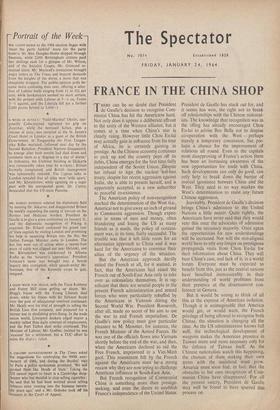FRANCE IN THE CHINA SHOP
THIRE can be no doubt that President de.Gaulle's decision to recognise Com- munist China has hit the Americans hard. Not only does it appear a deliberate affront to the unity of the Western alliance, but it comes at a time when China's star is clearly rising. However little Chou En-lai may actually gain in influence from his tour of Africa, he is certainly gaining in prestige. As the Chinese economy continues to pick up and the country pays of its debts, China emerges for the first time fully independent of the Soviet Union. ,Despite her refusal to sign the nuclear test-ban treaty, despite her recent aggreSsion against India, she is able to present herself, and is apparently accepted, as a new subscriber to peaceful co-existence.
The American policy of non-recognition marked the determination of the West (i.e., America) not to give away an inch of ground to Communist aggression. Though expen- sive in terms of men and money, often blundering and losing the US as many friends as it made, the policy of contain- ment was, in its time, fairly successful. The trouble was that it left little room for an alternative approach to China and it was hard for the Americans to convince their allies of the urgency of the situation.
But the American approach hardly suited the French at all, for it seemed, in fact, that the Americans had eased the French out of. South-East Asia only to take over as colonialists themselves. It is sig- nificant that there are several people in the present French administration and armed forces who were particularly rebuffed by the Americans in Vietnam during the Second World War. President Roosevelt, after all; made no secret of his aim to use the war to end French imperialism. De Gaulle's new policy must give particular pleasure to M. Messmer, for instance, the French Minister of the Armed Forces. He was one of the officials flown into Vietnam shortly before the end of the war, and then, when the Americans declined to aid the Free French, imprisoned in a Viet-Minh gaol. This resentment felt by the French against the Americans must be–a strong reason why they are now trying to challenge American influence in South-East Asia.
But French recognition of Communist China is something more than prestige- seeking, and even the desire to establish France's independence of the United States. President de Gaulle has stuck out for, and it seems has won, the right not to break off relationships with the Chinese national- ists. The knowledge that recognition was in the offing has already encouraged Chou En-lai to advise Ben Bella not to despise co-operation with the West — perhaps merely a temporary concession, but per- haps a chance for the improvement of relations all round. Even in the capitals most disapproving of France's action there has been an increasing awareness of the new opportunities for trade with China. Such developments can only do good, can only help to break down the barrier of mutual ignorance between China and the West. They need in no way weaken the West's determination to resist any future Chinese aggression. Inevitably, President de Gaulle's decision brings China's admission to the United Nations a little nearer. Quite rightly, the Americans have never said that they would veto this once the advocates of admission gained the necessary majority. Once again the opportunities for new understandings will be increased. Nor will the non-aligned world have to rely any longer on prestigious propaganda visits from Chou En-lai for their information about China. They will hear China's case, and lack of it, in a world forum. Everyone must be 'expected to benefit from this, just as the neutral nations have benefited immeasurably. in their understanding of world problems from their presence at the disarmament con- ference at Geneva.
But it would be wrong to think of all this at the expense of American isolation. Though it is unimaginable that America would get, or would want, the French privilege of being allowed to recognise both Chinas, the situation is changing all the time. As the US administration knows full well, the technological development of weapons makes the American presence in Taiwan more and more necessary only for the defence of Taiwan itself. As the Chinese nationalists watch this happening, the chances of them making their own terms with the mainland must grow. America must soon find, in fact, that the obstacles to her own recognition of Com- munist China have disappeared. For all the present outcry, President de Gaulle may well be found to have spurred this process on.


































 Previous page
Previous page